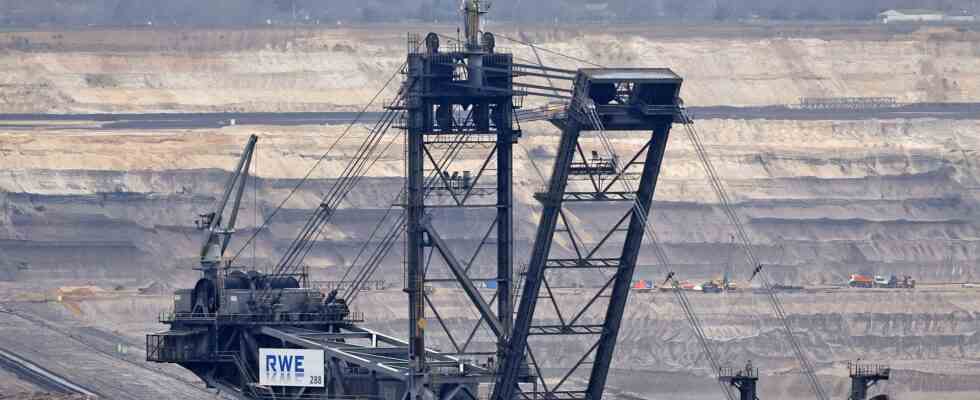Status: 01/11/2023 2:53 p.m
The energy company RWE no longer cares much about its coal business. In fact, the company has a vested interest in divesting itself of coal sooner rather than later.
Even if the current pictures from Lützerath might suggest otherwise at first glance: The coal business is no longer of great importance for the energy company RWE itself. A look at the company’s balance sheet shows that, in which the business with coal and nuclear energy is explicitly no longer counted as part of the core business. Instead, RWE focuses on the offshore wind, onshore wind/solar, water/biomass/gas and energy trading segments.
Coal is a phased-out model for RWE; It was only last autumn that the company reached an agreement with the federal government and the state of North Rhine-Westphalia to end lignite-fired power generation in the Rhenish mining area as early as 2030 – eight years earlier than the statutory phase-out plan previously provided for.
State makes RWE responsible for coal
Despite this, RWE reactivated three lignite blocks last year. However, this took place within the framework of the German replacement power plant availability law of July 2022 and was therefore primarily a consequence of legal requirements for saving gas. According to experts, the group has no self-interest in continuing the coal business beyond the goal of security of supply pursued by the state.
“Basically, it can be said that maintaining coal-fired power generation is more of a concern of the federal government to RWE in terms of guaranteeing security of supply. RWE itself, on the other hand, is no longer very interested in the coal business,” emphasizes analyst Guido Hoymann from Bankhaus Metzler in an interview with tagesschau.de.
Sparkling clean profits with dirty coal
And yet the coal should definitely have a positive impact on the 2022 balance sheet. In the months from January to September alone, RWE generated 42,447 gigawatt hours (GWh) of electricity from lignite and hard coal – this corresponds to a 36.8 percent share of total electricity generation.
In the first three quarters of last year, revenue from coal-fired power and other coal-based products accounted for 18 percent of consolidated sales. For 2022 as a whole, RWE expects a positive operating result for the coal/nuclear energy division of between EUR 650 and 750 million.
RWE could still earn a lot of money with the coal in the future. “Before the Ukraine war, the plans for the coming years envisaged an annual return of zero to 200 million euros. Now it’s more likely to be in the order of over 500 million a year,” explains Metzler expert Hoymann.
Will the state take over all of the RWE coal?
Against this background, it may come as a surprise that the group had already held talks in the past about completely transferring the coal business to the state, for example in the form of a foundation solution. These talks were interrupted in 2022 because of the Ukraine war, but according to industry experts, they should now be resumed quickly.
“RWE would immediately give away the coal for nothing, although there are also profits attached to it,” Hoymann is convinced. The company would be happy if it could finally close this chapter. There are good reasons for RWE to part with coal sooner rather than later.
Coal is a big disadvantage from an ESG perspective
“There are many large investors who would like to invest in RWE because RWE has made excellent progress in green power. But because of ESG regulations, they are not allowed to do so because RWE still carries the disadvantage of its coal capacities,” explains Analyst Hoyman.
The abbreviation ESG stands for verifiable criteria when investing in the dimensions of environment (environment), social (social) and responsible corporate management (governance). Fossil fuels such as coal or oil are among the so-called exclusion or negative criteria for investors who invest according to ESG guidelines.
According to a recent study by the auditing and consulting firm PwC Germany, ESG funds will grow significantly faster than the market as a whole, with an annual growth rate of 12.9 percent. By 2026, ESG assets under management will be $33.9 trillion. This would increase the ESG share of all globally managed assets from 14.4 percent in 2021 to 21.5 percent.
New price potential for the RWE share?
“Should RWE be able to part with the coal sooner, that would definitely be a huge boost for the share. We’re talking about 15 to 20 percent price potential,” emphasizes Metzler expert Hoymann. The RWE share is currently being traded at a clearly measurable discount compared to the purely green electricity suppliers.
“At the same time, RWE still has many gas-fired power plants to manage this transitional phase, because they can step in quickly when there is no wind or sun. This puts RWE in an almost perfect position to benefit from the green market growth in the electricity sector,” says Hoymann.
RWE is already one of the big winners on the stock exchange. With an increase of 16.4 percent, the share of the Essen-based group was the third-biggest DAX price gainer in the past stock market year behind Beiersdorf and Munich Re. For comparison: the leading German index lost 12.4 percent in the same period.

